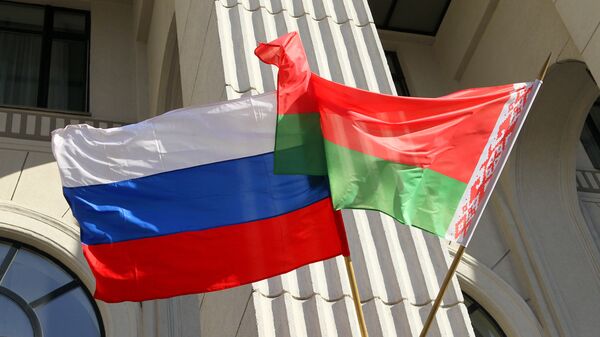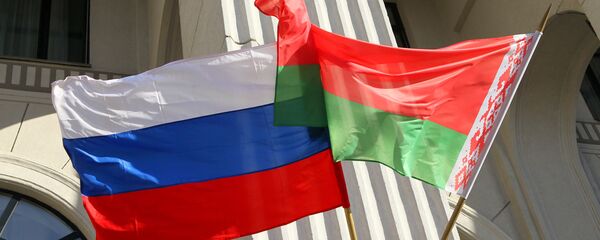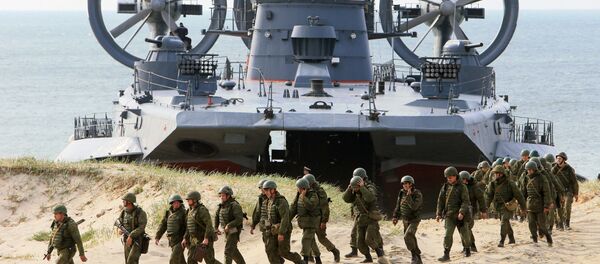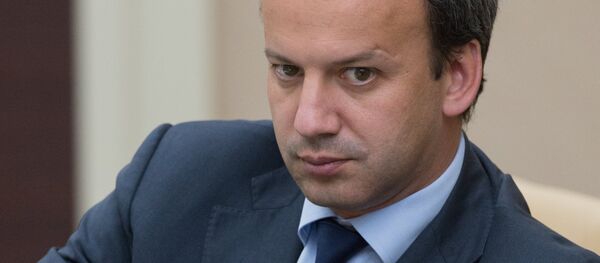MOSCOW (Sputnik) — The two leaders agreed on a scheme, allowing the two countries to maintain their positions and to close them on prices, as well as discussed how Russia and Belarus would continue work in the gas sector not only in 2017, but also in 2018 and 2019. The sides also agreed on resumption of regular oil supplies to Belarus, as well as reaffirmed their readiness to prepare and sign by 2024 an intergovernmental agreement on the formation of a unified gas market.
Russia and Belarus have very complicated relations in the gas and oil sphere, with the most serious disagreements taking place in 2006-2007 and 2009-2010, which resulted in aggravation of bilateral political relations and obstruction of Russian oil transit to the European Union.
In March 2006, CEO of Russia's Gazprom energy giant Alexei Miller said Belarus would have to pay since 2007 European-like oil prices for Russian gas. A contract for Russian gas with Belarus for 2007 was set to be signed by late 2006, but gas export talks were postponed several times. During their December 26, 2006 talks, Gazprom and Belarus failed to agree on gas prices in 2007.
After meeting with Belarusian Deputy Prime Minister Vladimir Semashko, Miller said Russia had made a very favorable offer to Belarus, at $75 per 1,000 cubic meters of gas (payable in cash), and $30 per 1,000 cubic meters (payable in shares of gas-transportation company Beltransgaz). Belarus insisted on its own terms, namely $75 per 1,000 cubic meters of gas, including $45 payable in cash, and $30 per 1,000 cubic meters, payable in Beltransgaz shares.
On December 27, 2006, Miller confirmed that Gazprom would have no obligation to export gas to Belarus, unless the bilateral contract was signed.
The five-year gas purchase-and-transit contract was signed in Moscow at 11:58 p.m. local time on December 31, 2006, only two minutes before the New Year. Under the document, the price for Russian gas was $100 per 1,000 cubic meters. From January 1, 2008, the gas price formula matched Europe’s and stipulated 67, 80 and 90 percent discounts for 2008, 2009 and 2010, respectively. Considering gradual price hikes, Belarus would pay European-like prices for Russian gas by 2011, Miller said.
In early December 2006, Russian Prime Minister Mikhail Fradkov signed a resolution stipulating export duties on all oil being shipped to Belarus and countries that are not members of the Customs Union. Russia’s decision was a response to Belarus having annulled an inter-governmental agreement on the transfer of 85 percent of export duties charged on petroleum products manufactured in Belarus from Russian raw materials, to Russia and the remaining 15 percent to Belarus.
On January 1, 2007, Belarus began charging duty ($45 per a metric ton) on all Russian oil being transited to Europe via Belarus that resulted in stopping oil distribution to Poland and Germany via the Druzhba (Friendship) pipeline on January 7, while Slovakia stopped receiving Russian oil on January 8.
On January 10, the Government of Belarus repealed this duty, and oil deliveries to Europe resumed on January 11. On January 12, the governments of Russia and Belarus signed an agreement on streamlining their trade and economic cooperation as regards oil and petroleum exports, after two days of talks. On February 15, Belarus raised the price of Russian oil transits via its territory by over 30 percent. Officials at the Belarusian Ministry of Economics said the price hike was due to the fact that the price had remained unchanged since 1995. Thus, Belarus has brought oil transit rates in line with analogous Russia’s rates, they noted.
In June 2010, Moscow and Minsk engaged in a dispute over gas payments once again. From early 2010, Belarus had been paying for Russian gas in line with unilaterally stipulated prices, rather than under a bilateral contract. Its gas debt eventually reached about $200 million. On June 15, Russian President Dmitry Medvedev said Belarus had five days to make the payments, and Gazprom set the deadline for June 21, noting that gas distribution might later be reduced if the situation remained unresolved.
On June 21, Gazprom moved to limit gas distribution to Belarus. Gas deliveries were cut by 30 percent on June 22, with Belarusian leader announcing that Belarus would stop forwarding Russian gas to Europe. On June 23, Gazprom reduced the gas volume being sent to Belarus to 60 percent of planned volumes, citing Minsk’s debt. In turn, Miller said gas transits to Europe via Belarus were being made in full volume, and that the end users had no trouble receiving it. In the morning of June 24, Gazprom said Belarus had repaid its debt, and that gas deliveries to the republic had resumed.
President of Azerbaijan Ilham Aliyev loaned money to Belarus to pay for Gazprom gas.
In late March 2010, the Government of Belarus asked the CIS Economic Court to forbid Russia from charging duties on petroleum products being delivered to Belarus, citing the inter-governmental free trade agreement of November 13, 1992 and the protocol stipulating a free trade schedule between Belarus and Russia of January 6, 1995. The latter noted that the sides would not charge duties during mutual trade.
Belarus maintained that crude oil was the only exception to the duty-free trade agreement. Part of the crude oil sales were covered by export duties under the Belarusian-Russian inter-governmental protocol of January 27, 2010 that stipulated Russian-oil delivery terms with Belarus. Moscow called the lawsuit groundless because the Russian Federation had the right to charge export duties even within the Customs Union.
On October 8, 2010, the CIS Economic Court gave Belarus and Russia three months to settle their petroleum-duty disagreements out of court.
On December 9, Russian Minister of Economic Development Elvira Nabiullina said, after a meeting of the heads of State of the Customs Union member-countries, that Moscow would suspend oil export duties for Minsk starting January 1, provided that the latter ratified documents on the Common Economic Space, and that petroleum export duties were levied on the Customs Union’s external borders. Belarus agreed to transfer all duties back to Russia.
Another bilateral oil and gas disagreement flared up in 2016 and continues to this day. Minsk called Russian gas prices unfair and unilaterally reduced them. By the fall of 2016, Belarus owed $270-300 million for Russian gas. Minsk refused to acknowledge the debt, with Russia reducing its duty-free oil exports to Belarus saying it was due to inadequate gas payments and insufficient petroleum products’ shipments to the Russian Federation. On September 28, the Belarusian Ministry of Anti-Monopoly Regulation and Trade issued a unilateral resolution that raised the average Russian oil transit rate by 50 percent. The resolution was to have entered into force on October 11, 2016. Moscow called the decision unlawful. On October 10, both sides said they had reached a compromise. Under the agreements, Moscow was to have reinstated duty-free oil shipments to Belarus, with Minsk annulling the decision on higher oil transiting rates.
The disagreement, however, has remained unresolved.
A Belarusian Ministry of Anti-Monopoly Regulation and Trade resolution on charging higher rates on Russian oil being transited via the republic entered into force February 1, 2017. The price of transporting oil to Naftan Ltd. increased by 11.76 percent, and by 7.7 percent on other routes. Earlier, sources at the Ministry of Anti-Monopoly Regulation and Trade explained that Belarus and Russia had only managed to coordinate prices for delivering oil to the Novopolotsk refinery, and that Belarus had set the other rates without prior agreement with the Russia, taking advantage of its right under the provisions of a bilateral inter-governmental agreement. The new rates are to be effective from February 1 through December 31, 2017.
The Russian and Belarusian prime ministers discussed the oil and gas dispute on March 30. After the meeting, Russian Minister of Energy Alexander Novak said Belarus was not ready to repay its $700-million debt without receiving substantial preferences from Russia.





